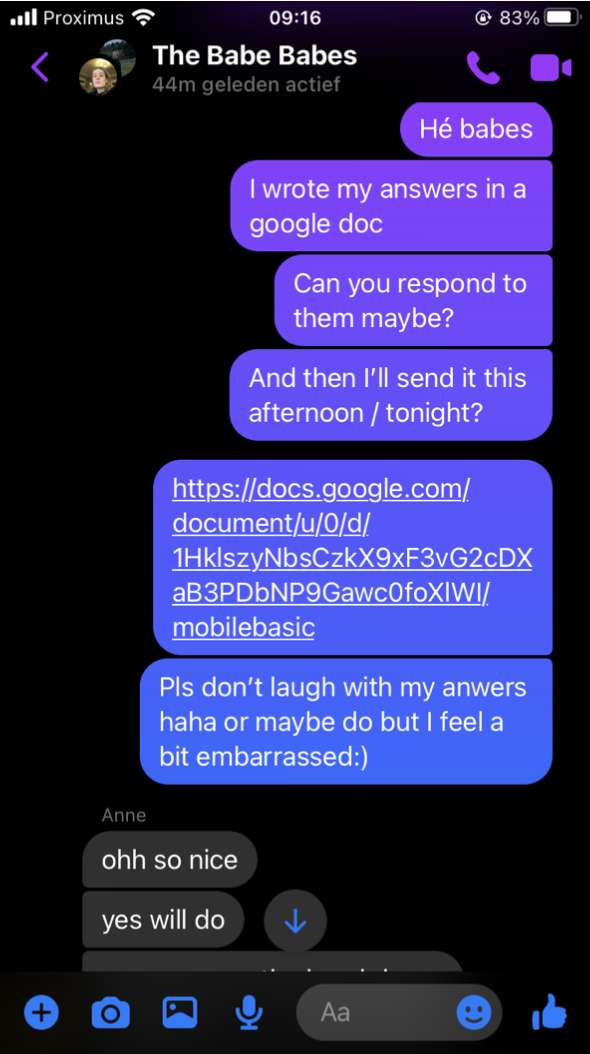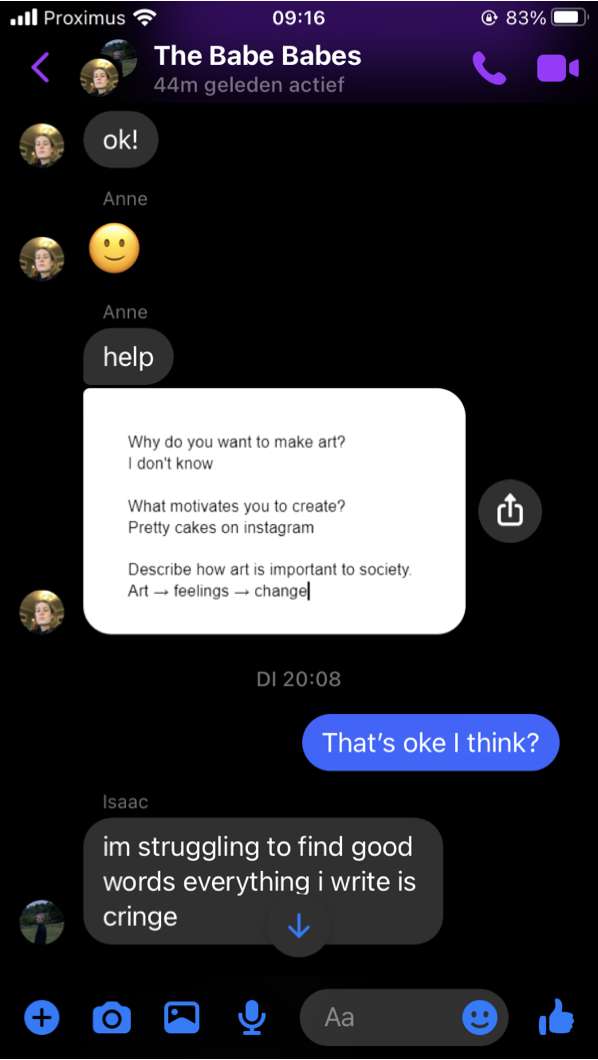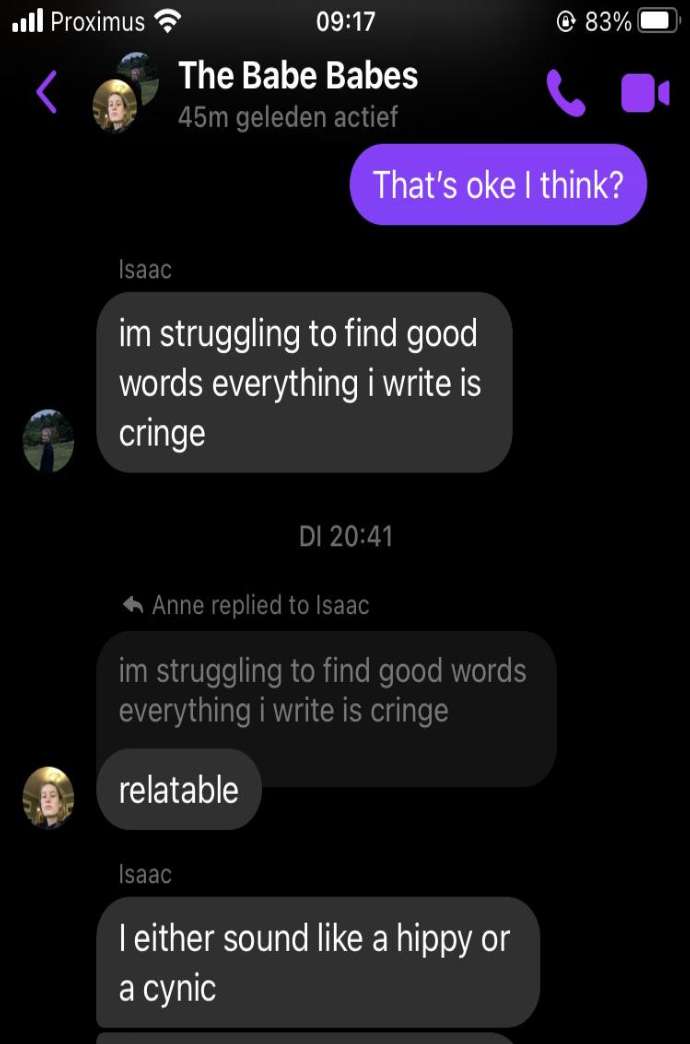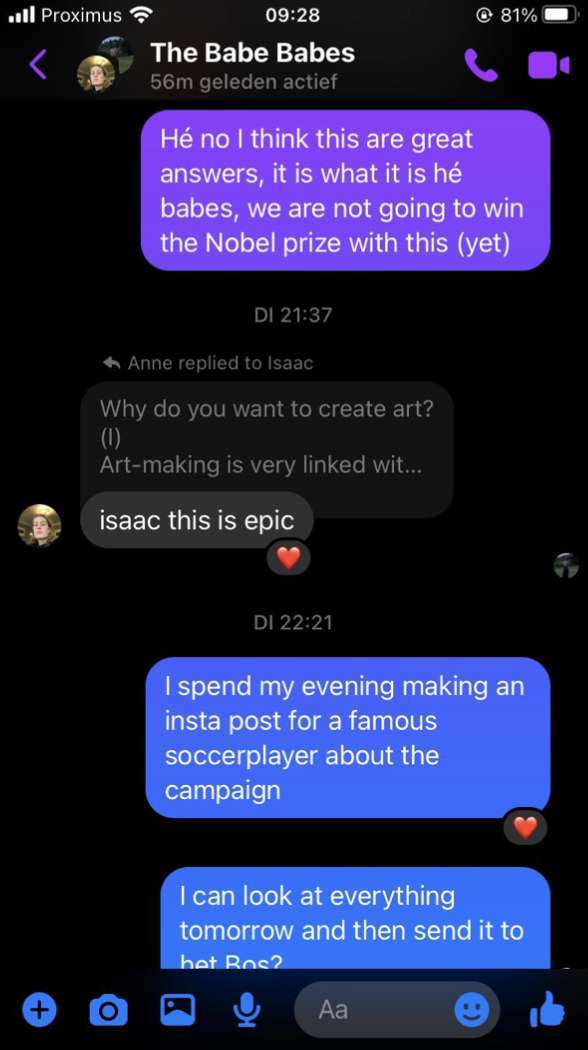Anne, Isaac en Lotte zijn drie goed bevriende interdisciplinaire artiesten die zweven tussen audio-visuele kunsten, performance, geluidskunst, dramaturgie en schrijfkunst.
Ze ontmoetten elkaar door hun betrokkenheid bij One Field Fallow, een Brusselse offspace.
Lotte Vrancken hun kunstpraktijk bevindt zich tussen het schrijven van poëzie en cultuurkritiek, dramaturgie, performance en ondersteunend werk voor andere artiesten. Hen studeerde Performance Theory aan Universiteit Gent en een jaartje Woordkunst aan het Antwerpse Conservatorium.
Centraal in hun projecten staat luisteren naar verhalen en geluiden die al te gemakkelijk worden overstemd door het drukke culuurleven in de grootstad dat Lotte leeft.
Anne Roosenberg is een performancekunstenaar en geluids- en video-editor die haar jeugd doorbracht in Schermerhorn, een piepklein dorpje in Nederland. Anne behaalde een Bachelor Literatuur, Film en Filosofie aan het Amsterdam University College en studeerde ook een jaar Woordkunst aan het Antwerpse Conservatorium. Hen bakt momenteel belachelijk veel foaccias en spint en kleurt minstens zoveel schapenwol.
Zelf omschrijft hen hun werk als volgt:
“I am Anne and I make things. I am Anne and I make things. I am Anne and I make things. I am Anne and I make things. I am Anne and I make things. I am Anne and I make things. I am Anne and I make things. I am Anne and I make things. I am Anne and I make things. I am Anne and I make things. I am Anne and I make things. I am Anne and I make things. I am Anne and I make things. I am Anne and I make things. I am Anne and I make things. I am Anne and I make things. I am Anne and I make things. I am Anne and I make things. I am Anne and I make things. I am Anne and I make things. I am Anne and I make things.”
Isaac Moss is een audiovisueel kunstenaar uit het Verenigd Koninkrijk die zich recentelijk in Brussel vestigde na ettelijke Berlijnse jaren. Hen behaalde een Bachelor Schilderkunst aan het Edinburgh College of Art.
Isaacs praktijk focus voornamelijk op het onderzoek naar de relatie tussen beeld en taal. Middels een meer en meer interdisciplinaire aanpak onderzoekt Isaac hoe verschillende communicatievormen kunnen worden gebruikt of misbruikt.
The Babe Babes resideren in Het Bos van 23 maart tot en met 3 april
Lotte Vrancken organiseert met In My Name op 31 maart Climate Activists for Migrants in Het Bos.
Hi all,
We are the Babe Babes, as we tried to answer these questions, we realized the process of answering was already pretty emblematic for the Babe Babes: we wanted to see each other to answer but we are all super super busy working/baking/ demolishing walls /taking trains/working more, so Isaac chose three questions and then we decided to answer them separately, although always connected -because we are always online.
This led to the following conversation:




And the following answers:
Why do you want to create art?
Lotte: When I was on Erasmus in Paris, one of my theatreteachers told my class “I make theatre because it is my way to reflect about the world. To understand what is happening inside myself and around me, I need a floor and some people trying things out with me, to come to an understanding about what this all is, and how to respond together. Other people think on paper, I think on the floor.” Although his words sound a bit arrogant when I write it down now, it is something that really stuck with me. I just have the feeling I understand myself and the world around me better when I’m making things.
Anne: I think everyone is always creating. Committing a small amount of my creating-time to specifically creating art feels good because I like the freedom of expression it brings. Then again, I am trying to have a very broad definition of art. I feel like ‘creating art’ is a way of seeing things that you normally already do in a new way and just presenting these things differently, and this changing of perspectives is what I want to have much of in my practice.
Isaac: Art-making is very linked with learning and understanding the world around me. It's like mutual storytelling, where I'm able to be the narrator and listener simultaneously. When working on a project, I’m able to glimpse an idea from different angles, where my view and the perspective of the work merge. I rarely know in advance what is being brought forth in a piece, but things are always revealed that I didn’t anticipate.
What motivates you to create?
Lotte: I think my biggest motivation is adding perspectives to a mainstream narrative, and while doing that trying to make space for other perspectives next to mine as well. Also I love it when something (a text, a performance, a pizza) starts to exist next to me, to see the unexpected relations the created thingy has with others, things, the world. It sounds easy but I’m feeling happy when I’m making things, even when it is about difficult themes. That’s also what I like about the babebabes, although I think we are tackling things that are difficult for us / society sometimes, we also just have a lot of fun.
Anne: Mostly seeing other people create. I don’t just love to see the products or results of this; I mainly love seeing what the creative process can bring to people. Noticing what this can do for my friends makes me want to live by creating too.
Isaac: I'm most motivated by the appeal that things could be different, and I want what I create to contribute to making that change compelling.
Describe how art is important to society.
Lotte: This one is super important to me. I think art is crucial to society because radical imagination is crucial to imagine (social) change, especially in a society where “there is no alternative” is the most heard credo. I think art can present (new) ways of thinking and living together, even and especially ways that aren’t often heard.
As a viewer I’m always looking for the suggestion in an artwork: how to think with the work about the world, and how the work suggests change.
Anne: Art is about feelings and communication. I think this combination is what leads to growth (meaning the non-capitalist nice version of growth).
Isaac: I struggle to identify or define either art or society, as they both have mutable borders. As far as I understand both are better understood as ‘gazes’ with which we might call the same thing different names. The only thing I know is that both are as ugly as they can be pretty. I think it’s very easy to put art on a pedestal in its attempt to be reflective and society as passive in its assumed stability. Both are built in a certain way and share more in common with structures of power than with care.
